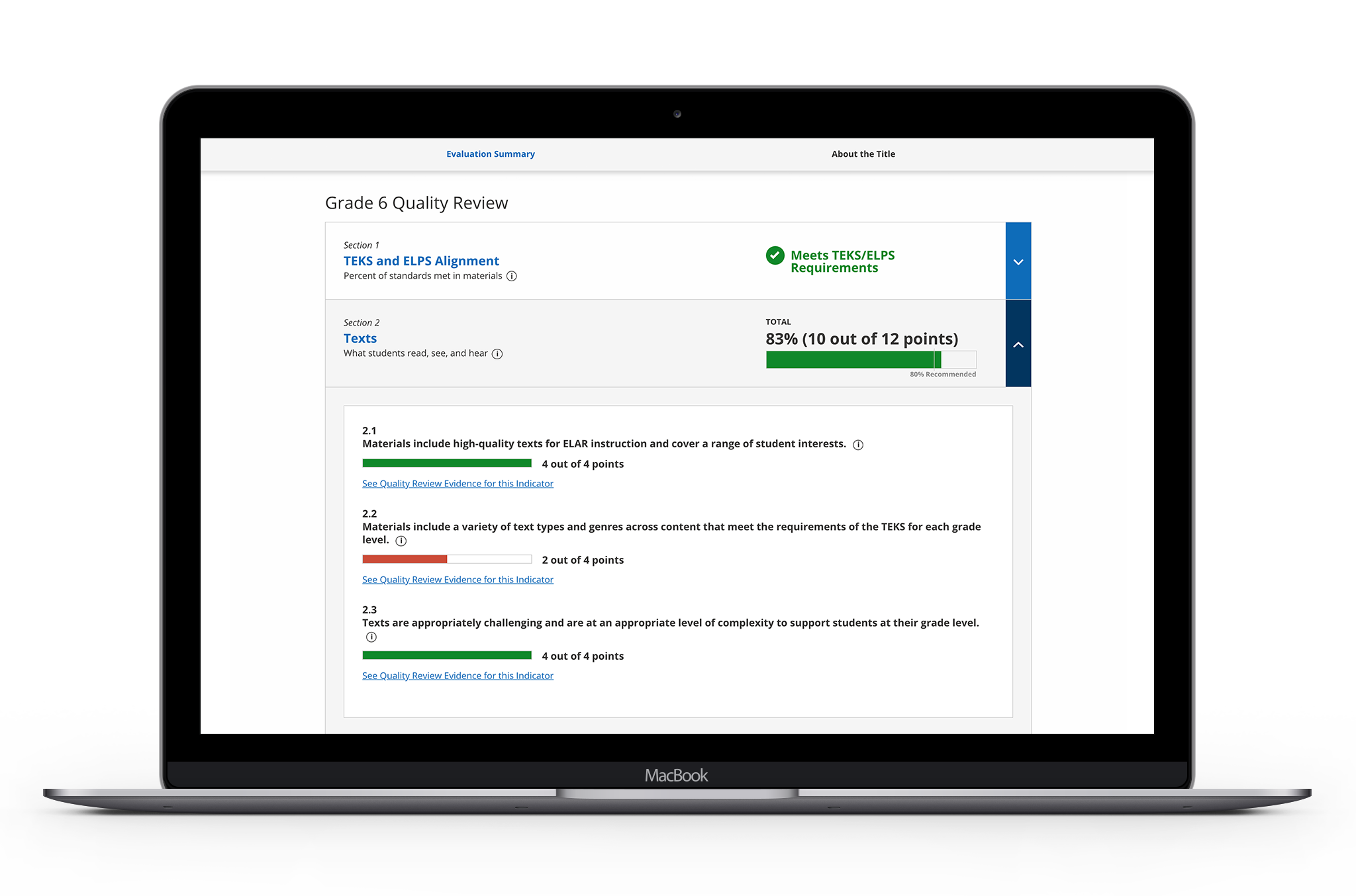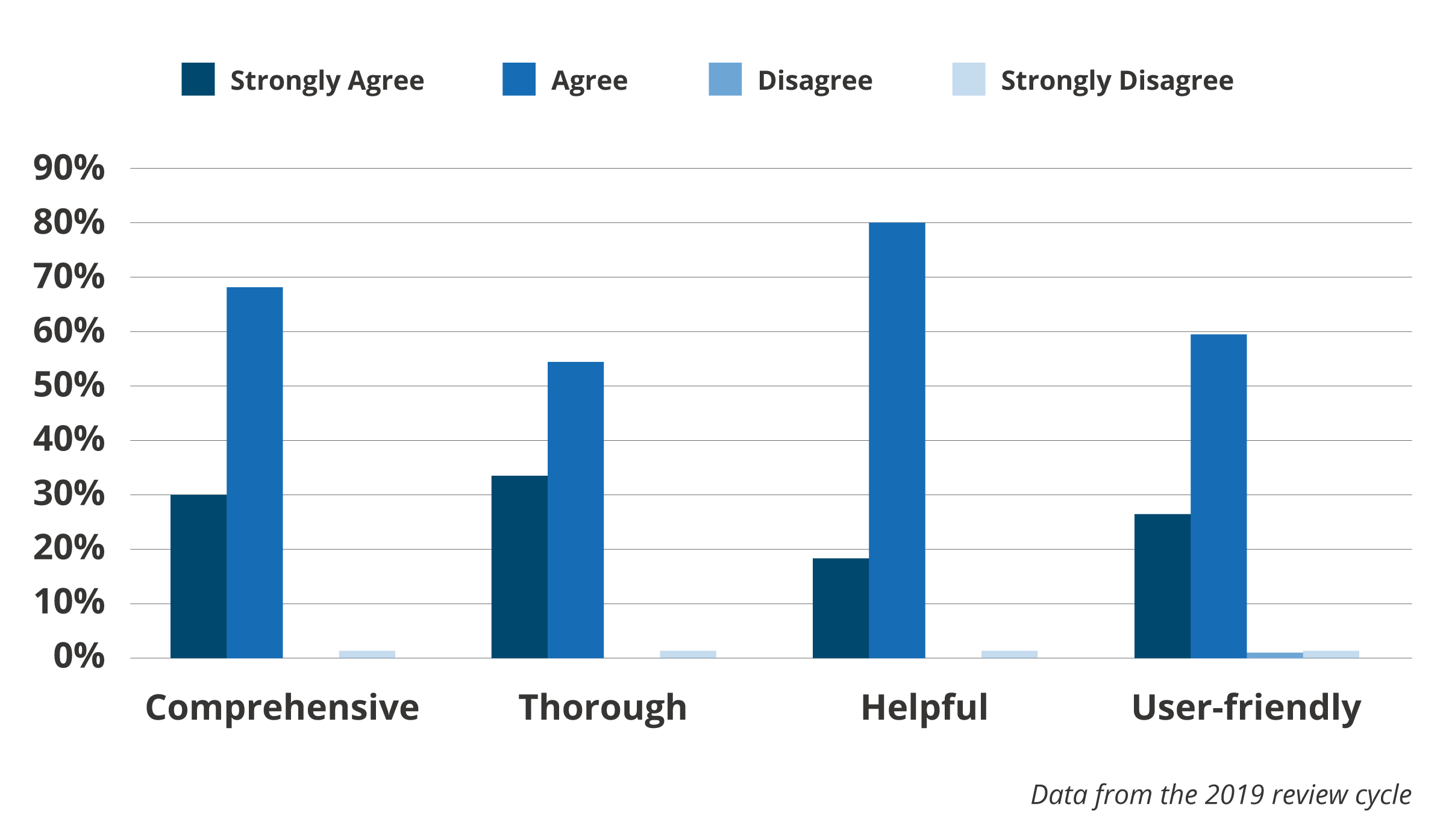The purpose of the Texas Resource Review is to assist school districts in selecting high-quality instructional materials. The quality reviews are published on the TRR website in a user-friendly format to help Texas educators find the information they need to make decisions that best meet their local needs.
How are Reviews Structured?
Quality reviews are divided into categories, sections, subsections, indicators, and guidance, mirroring the structure of the rubrics.

Category 1: TEKS and ELPS Coverage
Texas state standards coverage is essential for high-quality instructional materials. All products are submitted to the established SBOE state review process to determine the extent to which they cover the Texas Essential Knowledge and Skills (TEKS), the English Language Proficiency Standards (ELPS), or in the case of prekindergarten systems, the Texas Prekindergarten Guidelines (TPG).
State review panel members review instructional materials to determine the extent to which the TEKS or TPG and ELPS are covered and to identify factual errors. To be eligible for adoption, instructional materials must meet at least 50% of the TEKS (or in the case of prekindergarten materials, 50% of the Texas Prekindergarten Guidelines in the components intended for student use and the components intended for teacher use), be free from factual error, meet manufacturing specifications, be suitable for the intended course and grade level, and be reviewed by academic experts. The review results in four outputs related to the percentage of standards covered: TEKS/TPG present in materials intended for student and teacher use, and ELPS present in materials intended for student and teacher use.
Category 2: Content and Instructional Concepts
This category focus on how well standards are addressed by instructional materials. Sections within this category evaluate guidance for effective teaching and learning specific to the content.
Category 3: Educator Supports
This category focuses on aspects of instructional materials that directly relate to tools and resources for supporting instruction. Sections within this category focus on the guidance and support students and educators need to ensure all students learn and succeed.
Category 4: Additional Information
This category provides information on technology requirements, cost, professional learning, and additional language supports as shared by the publisher.

What Other Information is Available?
- Grade band summaries provide an overview of products within a vertical program.
- General product information including ISBN, copyright year, technical specifications, and pricing.
- Quality review category scores of products within the same grade level and subject area can be easily compared.
How did Districts Respond to the Quality Review Pilot?
Over the past year, TEA has developed the quality review process and tested it through a pilot in English Language Arts & Reading for grades 3-8. At the conclusion of the pilot, convenings were held to share findings with 30 districts from various regions of Texas. District educators and leaders read reviews and previewed how results would be displayed on the TRR website. Districts shared their feedback with TEA.
98% of pilot LEAs strongly agreed or agreed that the pilot reviews are comprehensive, thorough, and helpful.
100% of pilot LEAs strongly agreed or agreed that they would use future reviews of additional products, content areas, and grade levels to help them make local purchase decisions.
Survey Results in Response to Quality Review Goals:

What are Districts Saying About the Texas Resource Review?
Pilot districts commented on the helpfulness of the supporting evidence they were provided during the pilot experience.

The focus on evidence is powerful. It helps me see what questions I need to ask publishers and what elements of the materials that I would like to look closer at.
Pilot District

I really found the review teams' supporting evidence very helpful and honest. I liked the specific examples they included.
Pilot District

Evidence from reviewers provides additional insights into the strengths and potential gaps in the curriculum. They were very thorough and useful.
Pilot District

The evidence was incredibly helpful to me. I like how specific it is, including examples from different lessons, and the amount of information available.
Pilot District
